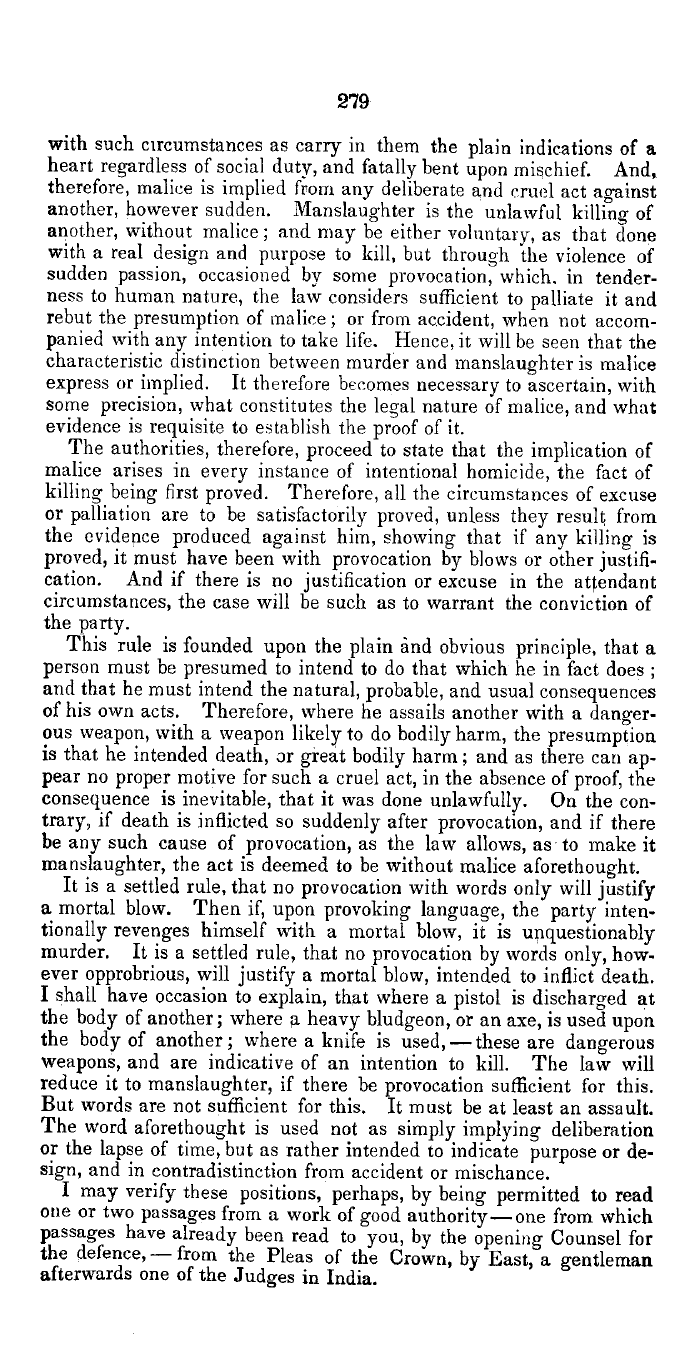|
279
with such circumstances as carry in them the plain indications of a
heart regardless of social dutv, and fatally bent upon mischief. And,
therefore, malice is implied from any deliberate and cruel act against
another, however sudden. Manslaughter is the unlawful killing of
another, without malice; and may be either voluntary, as that done
with a real design and purpose to kill, but through the violence of
sudden passion, occasioned by some provocation, which, in tender-
ness to human nature, the law considers sufficient to palliate it and
rebut the presumption of malice ; or from accident, when not accom-
panied with any intention to take life. Hence, it will be seen that the
characteristic distinction between murder and manslaughter is malice
express or implied. It therefore becomes necessary to ascertain, with
some precision, what constitutes the legal nature of malice, and what
evidence is requisite to establish the proof of it.
The authorities, therefore, proceed to state that the implication of
malice arises in every instance of intentional homicide, the fact of
killing being first proved. Therefore, all the circumstances of excuse
or palliation are to be satisfactorily proved, unless they result from
the evidence produced against him, showing that if any killing is
proved, it must have been with provocation by blows or other justifi-
cation. And if there is no justification or excuse in the attendant
circumstances, the case will be such as to warrant the conviction of
the party.
This rule is founded upon the plain and obvious principle, that a
person must be presumed to intend to do that which he in fact does ;
and that he must intend the natural, probable, and usual consequences
of his own acts. Therefore, where he assails another with a danger-
ous weapon, with a weapon likely to do bodily harm, the presumption
is that he intended death, or great bodily harm ; and as there can ap-
pear no proper motive for such a cruel act, in the absence of proof, the
consequence is inevitable, that it was done unlawfully. On the con-
trary,, if death is inflicted so suddenly after provocation, and if there
be any such cause of provocation, as the law allows, as to make it
manslaughter, the act is deemed to be without malice aforethought.
It is a settled rule, that no provocation with words only will justify
a mortal blow. Then if, upon provoking language, the party inten-
tionally revenges himself with a mortal blow, it is unquestionably
murder. It is a settled rule, that no provocation by words only, how-
ever opprobrious, will justify a mortal blow, intended to inflict death.
I shall have occasion to explain, that where a pistol is discharged at
the body of another; where a. heavy bludgeon, or an axe, is used upon
the body of another; where a knife is used,-these are dangerous
weapons, and are indicative of an intention to kill. The law will
reduce it to manslaughter, if there be provocation sufficient for this.
But words are not sufficient for this. It must be at least an assault.
The word aforethought is used not as simply implying deliberation
or the lapse of time, but as rather intended to indicate purpose or de-
sign, and in contradistinction from accident or mischance.
I may verify these positions, perhaps, by being permitted to read
one or two passages from a work of good authority-one from which
passages have already been read to you, by the opening Counsel for
the defence, - from the Pleas of the Crown, by East, a gentleman
afterwards one of the Judges in India.
|

